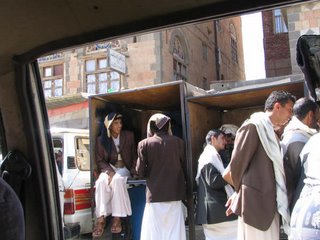Safety
I want talk about another issue in the Islamic world that some of you have commented upon and that is the violence that has shaken other Islamic countries over the Danish cartoons. Yemen has not suffered any violence because of this. All the stores across the street have stopped selling Danish products—most of the cheese and all of the butter was Danish. There is a sign in the window of my primary shop that announces, in Arabic and English, that they are boycotting Danish products. I do not anticipate any trouble. Aden has a very, very small foreign population and the Yemenis here are very kind and gracious. The only troubles foreigners have here are getting kidnapped and those are usually a few people who are part of a large tour group visiting some of the archaeological sites in central Yemen.
I have not had a single moment here when I felt in any danger—except in
the taxi ride from Sana’a to Aden last month. That was a harrowing experience—the driver and his friend were chewing qat, smoking, drinking water (necessary when one chews qat), changing the cassettes and talking…and driving very fast. I sincerely had to give my life up to God because it was not safe in the hands of those guys.
I have not had a single moment here when I felt in any danger—except in
the taxi ride from Sana’a to Aden last month. That was a harrowing experience—the driver and his friend were chewing qat, smoking, drinking water (necessary when one chews qat), changing the cassettes and talking…and driving very fast. I sincerely had to give my life up to God because it was not safe in the hands of those guys.



